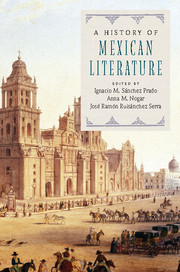Book contents
- Frontmatter
- Contents
- List of contributors
- Introduction
- PART I COLONIAL LITERATURE
- PART II THE NINETEENTH CENTURY
- PART III TWENTIETH AND TWENTY-FIRST CENTURIES
- 15 The Ateneo de la Juventud: The Foundations of Mexican Intellectual Culture
- 16 Regimes of the Avant-garde: Colonialists, Stridentists, Proletarians, Surrealists, Contemporáneos, and Independent Rupture (1920–1950)
- 17 The Institution of Fiction: From Yáñez, Rulfo, and Fuentes to Pitol and Del Paso
- 18 Octavio Paz: Literature, Modernity, Institutions
- 19 Mexican Poetry after the Avant-garde
- 20 Nonfictions: Essay, Criticism, and Chronicle
- 21 Balancing Acts: Twentieth- and Twenty-First-Century Mexican Theater
- 22 Women Writers in the Land of “Virile” Literature
- 23 The Hidden Histories of Gender: LGBTQ Writers and Subjectivities in Mexico
- 24 Mexican Literature in the Neoliberal Era
- PART IV MEXICAN LITERATURE BEYOND BOUNDARIES
- Index
- References
19 - Mexican Poetry after the Avant-garde
from PART III - TWENTIETH AND TWENTY-FIRST CENTURIES
Published online by Cambridge University Press: 05 July 2016
- Frontmatter
- Contents
- List of contributors
- Introduction
- PART I COLONIAL LITERATURE
- PART II THE NINETEENTH CENTURY
- PART III TWENTIETH AND TWENTY-FIRST CENTURIES
- 15 The Ateneo de la Juventud: The Foundations of Mexican Intellectual Culture
- 16 Regimes of the Avant-garde: Colonialists, Stridentists, Proletarians, Surrealists, Contemporáneos, and Independent Rupture (1920–1950)
- 17 The Institution of Fiction: From Yáñez, Rulfo, and Fuentes to Pitol and Del Paso
- 18 Octavio Paz: Literature, Modernity, Institutions
- 19 Mexican Poetry after the Avant-garde
- 20 Nonfictions: Essay, Criticism, and Chronicle
- 21 Balancing Acts: Twentieth- and Twenty-First-Century Mexican Theater
- 22 Women Writers in the Land of “Virile” Literature
- 23 The Hidden Histories of Gender: LGBTQ Writers and Subjectivities in Mexico
- 24 Mexican Literature in the Neoliberal Era
- PART IV MEXICAN LITERATURE BEYOND BOUNDARIES
- Index
- References
Summary
The diversity of poetic strands in twentieth-century Mexican poetry can be reduced to two: a cultured (or loneliness) poetry and a popular (or communion) poetry. It can be argued that one reason for this lyrical evolution is that the generation immediately following Octavio Paz, with poets born in the ’20s, represented a replica of Paz's aesthetic, while the next generation (of the ’30s) substantially followed Paz's poetic patterns. This essay's analysis will be focused on these two generations. The last part will be a review of the most significant poets of the generation of the ’40s and ’50s (members of the movement known as Neobaroque), as well as the generation of the ’60s and ’70s (the youngest) – whose aesthetic determined a return, on the one hand, to avant-garde formulations (specifically to language-driven poetry), and, on the other, to traditional poetry, which is always related to popular culture. Following a chronological path, we will start with poets from the generation of the ’20s. Influenced by the avant-garde movement, especially by two of its most important figures, César Vallejo and Pablo Neruda, poets of this generation partook in a poetry whose language was closely linked to social and political commitments. This poetry emerged during the interwar period and grew with the notion of the Russian Revolution of 1917 and, soon after, the triumph of the Cuban Revolution in 1959. Even though these poets do not write precisely political poetry, the vocation of the ’20s generation can be framed as social realism. Among the most outstanding poets are Jaime Sabines, Rubén Bonifaz Nuño, Rosario Castellanos, Eduardo Lizalde, and Tomás Segovia. They share a poetry that seeks to communicate its preoccupations through simple, colloquial language. They all fall short of radical experimentalism (such as Dadaism or surrealism), as one of the essential components of their aesthetic is clarity.
- Type
- Chapter
- Information
- A History of Mexican Literature , pp. 295 - 308Publisher: Cambridge University PressPrint publication year: 2016



